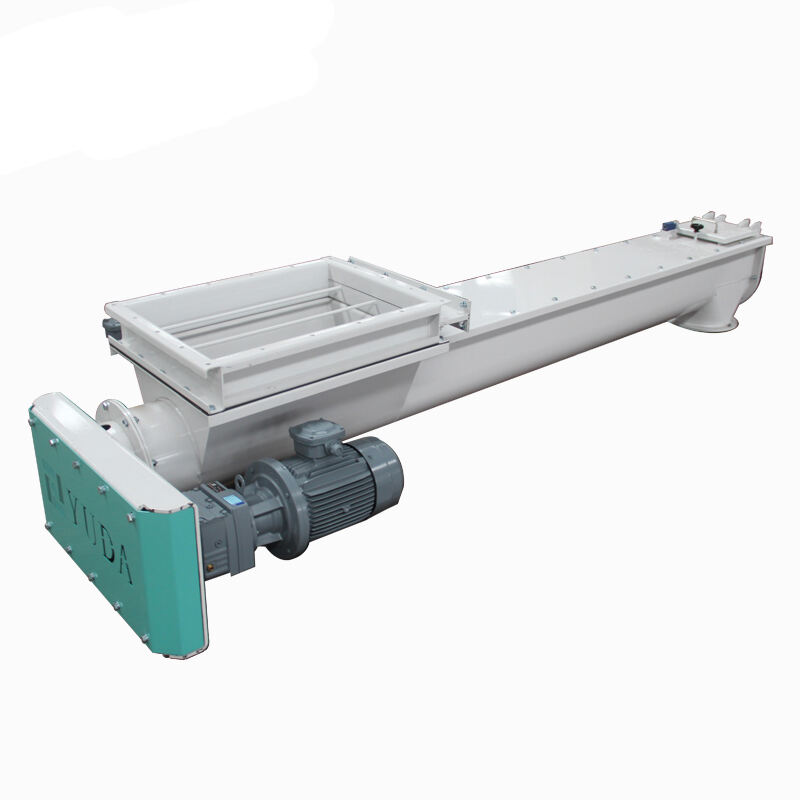In industries like feed manufacturing, fertilizer, and bulk material handling screw conveyors are very important. When maintained well, it will run smoothly and increase its uptime, and the lifetime of your equipment will be much longer. Here at Shanghai Yuanyuda International Trade Co., Ltd. we deal with feed and fertilizer machinery of the best quality such as screw conveyors that are efficient and of long lasting quality. The following is a practical guide in maintaining your screw conveyor to ensure long term reliability.
Regular Inspection and Cleaning
A regular preventive maintenance begins with examinations:
Look for Materials Accumulation: feed residual, fertilizer or other materials may become hard and block the flow. Wash the conveyor when not in use.
Examine Flighting and Shafts: Wear, corrosion or deformation (particularly of abrasive materials such as mineral fertilizers) should be sought.
Obvious Foreign Objects: Eliminate chips, metal pieces, or over dimensioned particles which may ruin the screw or motor.
Lubrication of Moving Parts
With a good lubrication, friction is reduced to a minimum and it wears early:
Bearings: The bearing lubrication must be performed as per the lubricating schedule as established by the manufacturers on regular basis. Over lubrication may attract dust and lack of it may lead to overheating.
Gearbox: Ensure the lubricant level is correct and replace the lubricant as decided.
Drive chains and sprots: Use the correct chain lubricant to rust proof and enhance.
Monitor Belt and Motor Performance
Electrical and mechanical components must function optimally:
Inspect Belt Tension: Loose belts may slip and over tight belts cause the motor to work hard. Modify according to requirement.
Visual Motor and Gearbox: Check and listen to any unusual sounds or vibration, which can be due to misalignment or bearing damaged.
Watch Power Usage: An abrupt elevation in power usage may be an indication of resistance due to an obstruction or mechanical problem.
Prevent Corrosion and Rust
As screw conveyors tends to process moist or even corrosive products (like fertilizers), it is necessary to protect metal components:
Upgrade to Stainless Steel or Coated Components: In applications with severe corrosion, consider using corrosion-resistant materials.
Use protective Coatings: Touch up paint or anti rust coating on bare surfaces regularly and inspect them.
Keep the Conveyor Dry: Keep in a covered place or use moisture resistant seals to avoid water damages.
Align and Balance the Screw Properly
The energy loss and excessive wearing are because of misalignment:
Check Screw Straightness: A bend auger may cause an unequal material flow and may cause high motor effort.
Trough alignment: The screw must turn in the center of the trough and not scrape against it.
Check Fasteners: Vibration may cause loosening of bolts or screws and eventually structural damages.
Train Operators on Best Practices
Without qualified care even the finest equipment will fail:
Avoid Overloading: Capacities to avoid jams and motor burnout: adhere to the recommended capacity limits.
Start and Stop Properly: Always start conveyor without any loads on it, then shut down without any loads on it to clear out remaining material.
Report Problems Early: Operator training should emphasize immediately reporting abnormal sounds, vibrations, or any changes in performance to maintenance crews.
Conclusion
Properly fixed screw conveyor entails efficient movement of materials with a maximum of lifetimes of downtimes and equipment. These are the maintenance phases, which comprises of regular checkups, good lubrication, corrosion inhibitor, as well as training of the operators that will enable you increase the life of your system as years go by.
High quality feed and fertilizer machinery are some of the heavy duty screw conveyors offered by Shanghai Yuanyuda International Trade Company, Limited which are very durable. Professional Assistance or Equipped with Performance Level? Get in touch with us now!

 EN
EN















